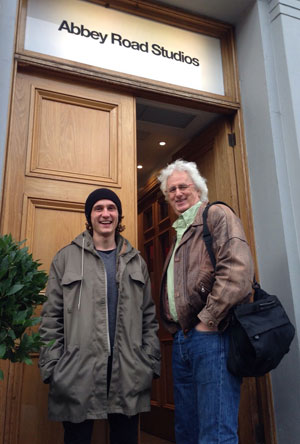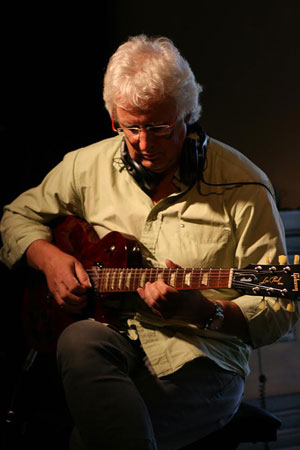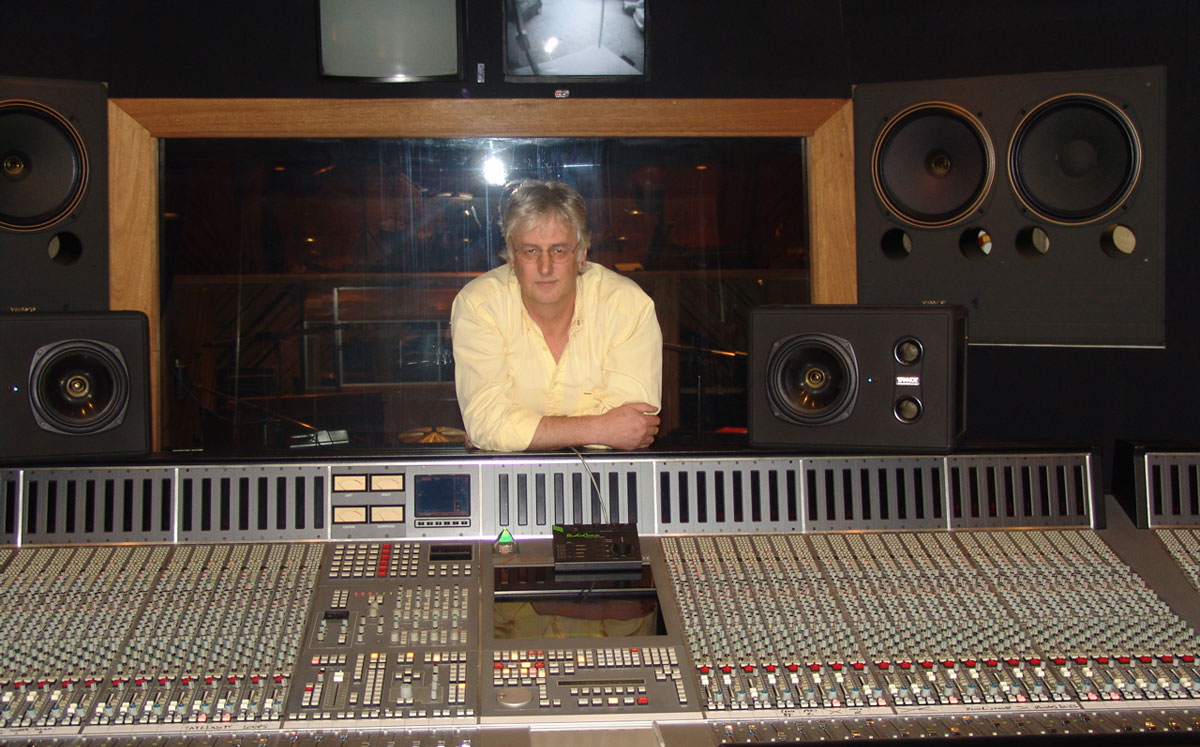Collaboration: it’s not important – it’s essential! | Tom Pearce
We were lucky to have none other than Tom Pearce join Drooble, so we asked him to share some of his experience being a music industry veteran with over 40 years experience in the technical and business sides of the industry. Over the years, Tom has worked with many of the worlds top artists like Elton John, George Harrison, Eric Clapton and Jeff Beck. Yes, we talked about that, the music business
today, and so much more – the interview with Tom is not one to miss!
Greetings, Tom! How did you discover Drooble and what do you think of our mission to unite musicians?
I discovered Drooble through one of your members – François Spannenburg – who suggested that it might be something I would appreciate. He was right!
There are all kinds of reasons for supporting any initiative that unites musicians, some of them creative reasons, some business, but most of all, really, I guess is just keeping alive the joy of playing and working with other musicians.
I think that technology these days can turn very talented people into hermits, locking themselves away in their own studios so, for me, anything that opens doors and lets in light is a very good thing indeed.
Introduce your current musical projects and tell us what makes them exciting for you!
Ah! Tricky. A lot of what I do these days is based around music project development in the game industry and most of that is pretty secret, I’m afraid, especially as project development can take a long time and cost a lot of money.
Developers don’t like risking an expensive idea being stolen and launched as an iPhone app after they have spent a couple of years developing it for PSVR 🙂 I don’t get into the studio as much as I would like these days and I miss the excitement of producing a new artist or a new song. However, I am a firm believer in media convergence (a term I hate, but have to live with) and that there are opportunities for growth and expansion in the music industry that labels and publishers have yet to explore.
This is the reason why I have become so involved in game music recently and I believe that the development of music-based apps, VR platforms and a whole host of other technologies will give composers and artists new outlets for their work and their talents and if the majors won’t embrace the ideas, the Indies certainly will. What makes it all exciting for me is the fact that we really are on the threshold of a new era – just like we were in the early 80’s with the development of digital audio, CD distribution and the birth of MTV.
It has taken a while but we are there again with VR and AR technologies as well as breakthroughs that we are making with game developers in understanding how to monetise music rights held in a game IP to the benefit of both the artists and composers as well as the IP owners themselves.

What are your most profound memories working with some of the world’s top-level artists, such as Jimmy Page and Elton John?
I could go on for hours on this topic! My most profound memories would have to include Live Aid – not just the show itself but also the work we did before and long after the event. We really did make a profound difference.
Working for Jimmy was an honour and working for Elton for so many years was simply a joy, too many memories to mention here but many of those memories also included the legendary producer Gus Dudgeon who was both a friend and a mentor as well as a prolific source of fun both in and out of the studio. He and his wife Shiela are sorely missed by all of us who knew him.
Probably, for me, my most profound memory came in 1991 during rehearsals for the George Harrison tour of Japan with Eric Clapton and his band. We were rehearsing at Bray Film studios (home of the original Thunderbirds sets and all of the Hammer House of Horror movies!) when one afternoon Paul McCartney and Ringo Starr dropped by to say hello. Within minutes they were onstage with George and Eric, just the four of them, playing Beatle songs.
I first saw the Beatles and Abbey Road studios as a kid in the mid 60’s watching the “All you need is love’ live transatlantic broadcast. I fell in love with the (then) amazing technology of international satellite TV broadcasting, recording studios in general, Abbey Road, George Martin and Geoff Emerick in particular and, of course, the Beatles themselves – it was a life-changing moment. Sadly, by the time I was old enough to find work in a studio myself, the Beatles were no longer a band so to have 3 out of the 4 onstage before my very eyes, with Clapton taking the John Lennon role was about as profound as it gets for me. Before anyone asks, we didn’t record it, no-one even took a photo. All of us there just knew that this was private, personal and magical.

As an experienced engineer and producer, what do you think about the democratization that happened to music recording?
Quincy Jones once said that “there is music and there is business – if you want to succeed, you had better learn the difference”. I would add that, these days, you need to learn both and learn them well. Back in the so-called ‘good old days’ there was only one medium available if you wanted to release your music – vinyl.
Pressing promoting and distributing vinyl singles and albums was expensive and risky and most, if not all, artists had no real choice but to sign up with a label. In addition, by comparison, studios were also very exclusive and way more expensive in real terms than they are now. The old joke of how to make a small fortune in the music industry is that you start with a big fortune and invest in a studio was true then and is still true now. The big difference is that you don’t actually need any of that now – I can do more in my office these days than I ever could imagine in the first studio I ever worked in.
Democratisation is an interesting word to use and in general, I am all in favour of it but it does kind of bring to mind an interesting comparison with the fall of the communist states in the late 80’s. Just like in the music business they went from a system of total control by a few powerful individuals to an open democracy powered by the many and in most cases, the many suffered just as badly as they did under the old regime. Democracy means that the power to succeed rests in your own hands and just because we have almost endless tools at our disposal to record, release, promote and distribute our music, it doesn’t mean that these tools perform some kind of magic that always leads to riches. At the end of the day, they are just tools. The one thing that a lot of artists these days forget is that the business itself has not changed… at all… in any way whatsoever.
For example, have you ever wondered why you need a UPC code for a digital upload? In other words, why does a digital file need the same barcode that was printed on the back of a CD insert? The reason is that the tracking systems used by iTunes etc. are exactly the same as they were with 7” vinyl singles 40 years ago. Steve Jobs didn’t revolutionise the music industry, he just gave us a different kind of shop.
I spend a lot of time advising artists who have recorded in their own studio, shoved the result out on Spotify and/or iTunes and then sat back waiting for the money to roll in. When it didn’t they started to wonder what went wrong. More than anything else, it is worth remembering that the real value in a piece of music is not in how many fans buy it but in what kind of deals you can make within the industry itself – licensing deals, master and publishing deals, sync deals and the list goes on and on.
To live and succeed in a democracy you have to learn to play the game and the rules of this particular democracy are pretty tough and haven’t changed much in years. Promotion is still one of the keys to success but again, understanding is the main thing. Take Facebook, for example. So many artists go all out on Facebook likes but they mean nothing at all – how many times have you liked a link a friend has sent you? It doesn’t mean that you will spend money – it often doesn’t mean even that you do like it, you’re just being friendly. Facebook followers are a more reliable indicator of possible future sales but it is worth applying the old ’10% rule’ there – if you have 1,000 followers, probably only around 10% of them will actually spend money.
So, to sum up, this rather long and tedious answer, you need to learn your trade as a musician but you also need to learn the business of music.
How important is collaboration for musicians’ development?
It’s not important – it’s essential!
What is it from your experience working with the elites that you most often have to bring to your clients?
Eric Clapton isn’t God, neither am I and neither are you! We all have good days and bad days and not everything we do is magical. Never be afraid to experiment, trust your heart before your ears and go into every session with an open mind.
How was life on the road during your time with Eric Clapton, George Harrison, and Jeff Beck?
From the 90’s onwards it was more civilised than you might expect (or want!). By the end of the 80’s the sex had become dangerous (AIDS, etc.), the drugs were expensive and the Rock and Roll had gone downhill dramatically but there were a few artists who rose above all that, Eric, George, Jeff and Elton in my own personal experience and there were others. All in all, it was an experience I would not trade for the world…I may write a book about it one day 🙂
What is the most important lesson you would like to teach every musician out there?
Respect each other – talent and personal taste are two different things.
Is there something that most musicians tend to always get wrong about learning music, or making it in the business?
I don’t think you can get it wrong when learning music unless you want to work in an orchestra – music is the interpretation of emotion, how can you get that wrong? As for making it in the business, well, most musicians get everything wrong most of the time because their focus is on their work – which it should be.
As a musician, composer or artist, you are going to have to put your trust in people who do things that you don’t understand or simply learn to do it yourself, which in my opinion, makes you less of a musician, composer or artist. I suppose learning to recognise when you need help would be a good start.
What does one absolutely need to do to get noticed in the very saturated, crowded, and competitive musical field?
I think the keyword in the question is ‘one’ – no matter how talented, dedicated or financially independent ‘one’ is, you won’t get far without help. A lot of that help would seem to be available on Drooble, so that’s a good starting point.
What are the best and worst tendencies in the current music industry, according to you?
Streaming pretty much sums up both tendencies! Spotify has a pretty democratic approach, within limits, as does Apple and if you know how to ‘use’ Spotify to your advantage you can get some pretty good results.
On the other hand, Tidal seems to be becoming a platform for Jay-Z and his mates, plus a few others who have deals with him. The tendency for the bigger streaming platforms to try to provide tools and services that any of us with a bit of know-how can use is a damned good thing while the tendency of other platforms to lock down their services to a select few, make deals with majors and shut out anyone else… well, that sucks.
What do you think about the roles of artist and producer having completely blended nowadays?
OK – here’s where about half of your audience will hate me 🙂 Traditionally the roles of artist, producer and, don’t forget, an engineer has always been pretty clearly defined and that has led to some stunning recordings – the Beatles / George Martin, Supertramp / Ken Scott, Elton / Gus Dudgeon, Michael Jackson / Quincy Jones and on and on so it is not surprising that I still feel that an artist needs a producer who can be creative in his own right, supportive, critical and inspirational.
Traditionally, also, the producer was the bridge between the label and the artist, often responsible for studio bookings and everything else that goes on outside of the control room and, at the end of the day, responsible for presenting the final product to the label, justifying the end result and the cost of it.
The second pair of ears and a second creative mind can always benefit a session. A producer has to know the industry and what is happening in it at the time as well as the studio and what is happening in there – it is a much broader role than simply sitting at the back making comments or stepping in and playing an instrument himself.
One thing I learned from Gus very early on was that an artist will know when a performance is good but only a producer will know if it is good enough.
A producer will often know instinctively when a thing is right, even if it does not appear that way at first. Take Paul McCartney’s comment when he was asked if he thought Ringo was the best drummer in the world – “He’s not even the best drummer in the Beatles!” Although George Martin experimented with other drummers – Alan White on the “Please Please Me” sessions, for example – because he agreed with the rest of the band that may be a ‘better’ drummer would be required now that they were on the verge of success, but he always went back to Ringo because without him the Beatles lost that spark of originality.
Producers come in all shapes and sizes, from the musically accomplished – George Martin, for example – to the musically inept but creatively brilliant – Gus, for example. I once had the pleasure of working with Gus while he was trying to explain to arranger and conductor James Newton Howard that he wanted some changes to the orchestral arrangement during a session with the London Symphony Orchestra. Gus: “At the start of the 2nd verse there is a twiddly bit that I would like louder” James, turning back to the orchestra: “ Gentlemen, in particular, 1st violins and violas, more emphasis on the triplet section from bar 38, please”. Making commercially viable music is all about collaboration, the bringing together of talents and a shared understanding of a common goal.
A producer is neither a 5th member of the band nor is he a complete outsider and it is a very difficult tightrope to walk but when it works, it really works.




